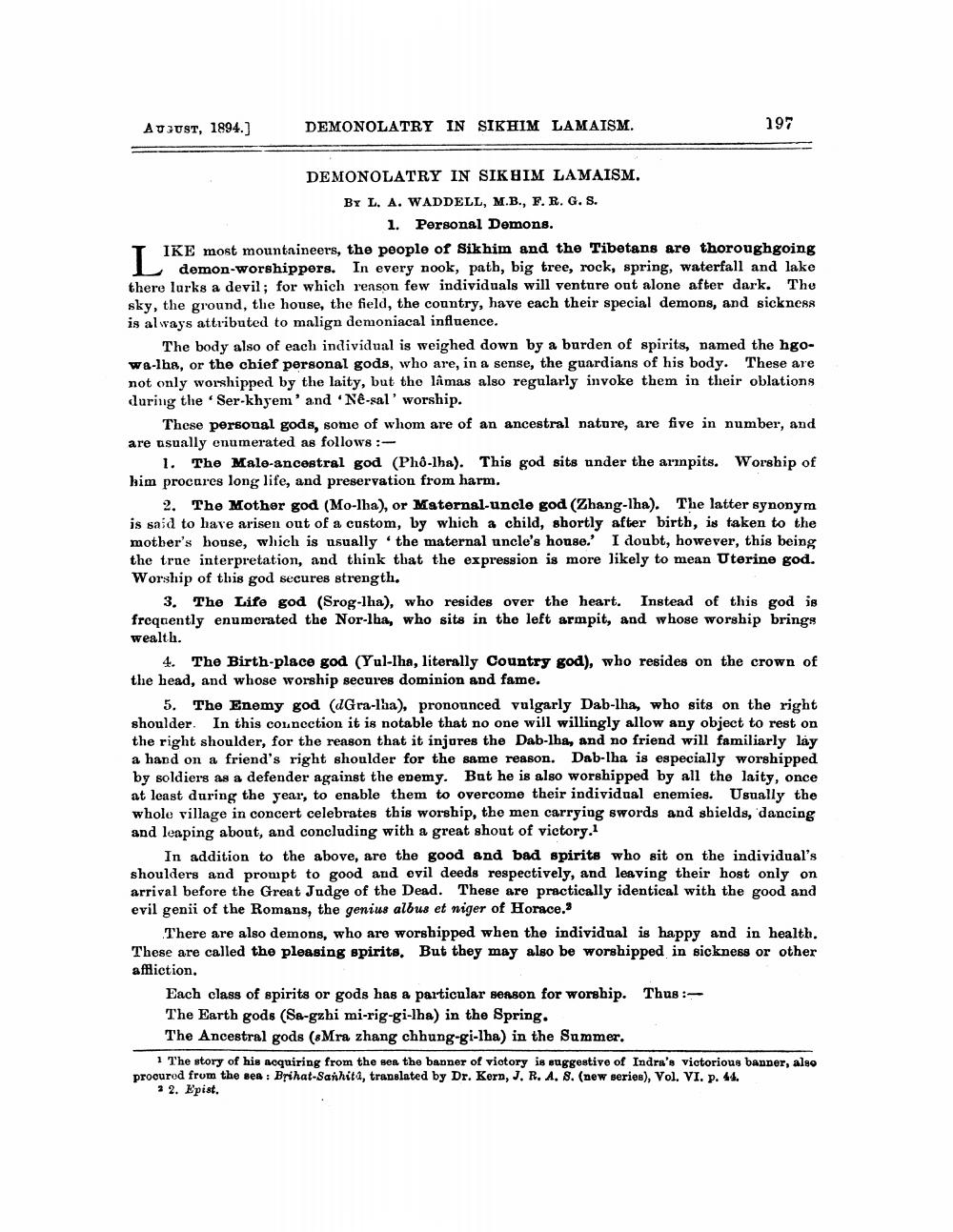________________
AUSUST, 1894.)
DEMONOLATRY IN SIKHIM LAMAISM.
197
DEMONOLATRY IN SIKHIM LAMAISM. By L. A. WADDELL, M.B., F.R.G.S.
1. Personal Demons. IKE most mountaineers, the people of Sikhim and the Tibetans are thoroughgoing L demon-worshippers. In every nook, path, big tree, rock, spring, waterfall and lake there lurks a devil; for which renson few individuals will venture ont alone after dark. The sky, the ground, the house, the field, the country, have each their special demons, and sickness is always attributed to malign demoniacal influence.
The body also of each individual is weighed down by a burden of spirits, named the hgowa-lhe, or the chief personal gods, who are, in a sense, the guardians of his body. These are not only worshipped by the laity, but the lamas also regularly invoke them in their oblations during the 'Ser-khyem' and 'Nê-sal' worship.
These personal gods, some of whom are of an ancestral nature, are five in number, and are usually enumerated as follows:
1. The Male ancestral god (Phô-lba). This god sits under the armpits. Worship of him procares long life, and preservation from harm.
2. The Mother god (Mo-lha), or Maternal-uncle god (Zhang-lha). The latter synonym is said to have arisen out of a custom, by which a child, shortly after birth, is taken to the motber's honse, which is usually the maternal uncle's house. I doubt, however, this being the true interpretation, and think that the expression is more likely to mean Uterine god. Worship of this god secures strength.
3. The Life god (Srog-lha), who resides over the heart. Instead of this god is frequently enumerated the Nor-lha, who sits in the left armpit, and whose worship brings wealth.
4. The Birth place god (Yul-Iha, literally Country god), who resides on the crown of the head, and whose worship secures dominion and fame.
5. The Enemy god (aGra-lha), pronounced vulgarly Dab-lha, who sits on the right shoulder. In this connection it is notable that no one will willingly allow any object to rest on the right shoulder, for the reason that it injores the Dab-lha, and no friend will familiarly lay a hand on a friend's right shoulder for the same reason. Dab-lha is especially worshipped by soldiers as a defender against the enemy. But he is also worshipped by all the laity, once at least during the year, to enable them to overcome their individual enemies. Usually the whole village in concert celebrates this worship, the men carrying swords and shields, dancing and lenping about, and concluding with a great shout of victory.1
In addition to the above, are the good and bad spirits who sit on the individual's shoulders and prompt to good and evil deeds respectively, and leaving their host only on arrival before the Great Judge of the Dead. These are practically identical with the good and evil genii of the Romans, the genius albus et niger of Horace.
There are also demons, who are worshipped when the individual is happy and in health. These are called the pleasing spirits. But they may also be worshipped in sickness or other affliction,
Each class of spirits or gods has a particular season for worship. Thus:The Earth gods (Sa-gzhi mi-rig-gi-lha) in the Spring. The Ancestral gods (Mra zhang chhung-gi-lha) in the Summer.
1 The story of his acquiring from the sea the banner of victory is suggestive of Indra's victorious banner, also procured from the sea : Brihat-Sanhita, translated by Dr. Kern, J. R. A. 8. (new series), Vol. VI. p. 44.
72. Epist.




